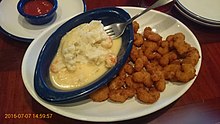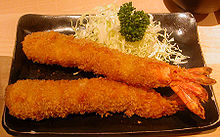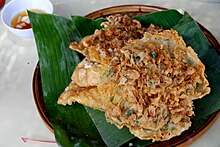Fried shrimp

Shrimp or prawn dishes are often prepared by frying, especially deep frying. There are several styles.
Popcorn shrimp

Popcorn shrimp is the name of several small shrimp fritters.[1] Cajun popcorn is a similar dish of peeled crayfish-tail fritters rich of spices,[2] where shrimps could also be used as a substitute for crayfish.[2]
Coconut shrimp

Crunchy varieties of coconut shrimp dishes are prepared with peeled shrimps dipped in batter, generously coated with grated coconut, and deep-fried.[2]
Internationally
Japan
There are two popular deep-fried prawn dishes in Japan, ebi tempura and ebi furai. The difference is that tempura is never breaded,[3] while breaded deep-fries are called furais.[3] Prawn cookings in Japan typically employ a straightening technique, by making several incisions on its belly side, then bend the prawn backwards to form straight prawns which they consider more appealing.[4]
Ebi tempura

Ebi tempura (海老天ぷら) or ebiten is tempura of prawn, with a light fluffy coat.[3] It is served as a main dish, with soy-based dipping sauce[5] or salt.[3] It can also be made into other dishes such as:
- Over noodles: tensoba and tempura udon,[6] but dishes with these names not necessarily contain prawns. They may be tempura of other ingredients.[6]
- On a bowl of steamed rice: tendon (tempura donburi). In one version, the tempura is dipped in a sauce before serving. This sauce is considerably thick and sweeter[7] than regular tempura dipping sauce.[5]
- Tenmusu: a rice ball snack (onigiri) topped with a shrimp fritter.[8]
Ebi furai

Ebi furai (海老フライ or エビフライ) is a breaded and deep-fried prawn dish, of darker and crunchy texture.[3]
Traditionally kuruma ebi was used, but many stores have started using cheaper black tiger shrimp.[9] It is thought that ebi furai was created around 1900 along with similar dishes such as tonkatsu in the Western food restaurants of Tokyo.[10]
Ebi furai is a popular ingredient of Japanese bento,[11] and ebi furai bentō (海老フライ弁当 or エビフライ弁当) is a common menu item in bentō products.[12]
Ebi furai became a specialty of the city of Nagoya due to a joke made by a popular Japanese tarento (celebrity) Tamori in the 1980s. He mocked Nagoya dialect by theorizing that Nagoyans would call ebi furai as ebi furyaa. Whilst this is false, it made people elsewhere to associate Nagoya with "ebi furyaa".[13] Restaurants in Nagoya took the opportunity by offering inventions such as dishes actually named ebi furyaa,[14] and a visual hybrid with the pride of Nagoya: the Golden shachi.[15]
Other Japanese foods
Ebi katsu is breaded and deep-fried surimi (paste) of shrimp meat.[16] It differs from ebi furai, which is a whole prawn.
Shrimp kakiage is a kind of tempura, airy, bulky and crunchy, made from a batch of chopped prawns or small whole shrimps, such as sakura shrimp.[17]
Korea

In Korean cuisine, fried shrimp is known as saeu-twigim (새우튀김). Along with ojingeo-twigim (fried squid) and other twigims, it is a common street food and a bunsikjip (snack bar) item. It is also a common anju (food accompanying alcoholic drinks) for beer.[18]
Philippines

Fried shrimp dishes in Philippine cuisine include camaron rebosado (battered shrimp), okoy (battered shrimp pancakes), halabos na hipon (fried or boiled shrimp cooked in its own juices or carbonated soda), and nilasing na hipon (battered shrimp marinated in alcohol), among others.[19]
Camaron rebosado is a deep-fried battered shrimp typically served with sweet and sour sauce. It is made by peeling large shrimp and marinating it in a mixture of calamansi juice, salt, and black pepper. It is then coated with a batter made from egg, flour, and corn starch before deep frying.[19][20]
Okoy is another native Filipino deep-fried dish that typically use small unshelled shrimp. The batter is uniquely traditionally made from galapong (ground soaked glutinous rice), mixed with calabaza, sweet potatoes, or cassava and various vegetables like carrots, onions, and green papaya. It is deep-fried into flat crispy pancakes and traditionally served with a vinegar-based dipping sauce.[21]
See also
References
- ^ Smith, Andrew F., ed. (2004). "Shrimp and Prawns". The Oxford encyclopedia of food and drink in America. Vol. 1 (1 ed.). New York: Oxford University Press. p. 488. ISBN 0195175514. LCCN 2003024873. Retrieved 2021-08-18.
- ^ a b c Prudhomme, Paul (1984). "Cajun popcorn with sherry wine sauce". Chef Paul Prudhomme's Louisiana Kitchen. New York: William Morrow and Company. pp. 281–283. ISBN 0-688-02847-0. Retrieved 2021-08-16.
- pp281–283: Cajun popcorn with sherry wine sauce
- pp283–284: Coconut beer shrimp with sweet and tangy dipping sauce
- ^ Light version tendon with regular sauce: Yukimasa, Rika (2019-01-18). "Ten Don [Tempura Rice Bowl]". NHK World-Japan. NHK. Archived from the original on 2019-09-11. Retrieved 2021-08-18.
- (excerpt re-arranged for comparison): Sauce: Dashi sources, water 200 mL, soy sauce 40 mL, mirin 40 mL, sugar 1 tsp. Boil water, add seasonings, soon remove from heat.
- ^ a b Nozaki, Hiromitsu. "Shrimp and vegetable tempura". NHK World. NHK. Archived from the original on 2021-08-19. Retrieved 2021-08-18.
- (excerpt re-arranged for comparison): Sauce: Dashi 120 mL, usukuchi soy sauce 20 mL, mirin 20 mL. Microwave them for 1–2 minutes
- ^ a b k_yamamuro (2017-10-22). "Udon And Soba - 10 Varieties You Have to Try When You Visit Japan!". MATCHA. 2. Tempura Soba / Tempura Udon. Retrieved 2021-08-18.
- ^ Heavy version tendon: Sōtome, Tetsuya (2013-07-18). "Ebi tendon" えび天丼. Minnano kyōno ryōri (in Japanese). NHK. Archived from the original on 2021-02-25. Retrieved 2021-08-18.
- ^ "Tenmusu". Nagoya City Guide. Nagoya convention & visitors bureau. Retrieved 2021-08-18.
- ^ "Food mislabeling scandal spreads to department stores". JapanToday. 2013-11-06. Retrieved 2021-08-18.
- ^ "13. Ebi-furai". Nagoya-meshi. Nagoya Meshi Promotions Council. 2020-03-31. Archived from the original on 2020-02-08. Retrieved 2021-08-18.
- ^ 新学期からのお弁当におすすめ!最新の人気冷凍食品は何?定番のおかずは? [Bento items. Which frozen foods are most popular? What sides most frequently appear?]. Softbrain Field Co. Ltd. (in Japanese). 2017-08-18. ■入っているとうれしいおかずは. Archived from the original on 2021-08-18. Retrieved 2021-08-18.
- An informal online consumer survey performed by reward websites in August 2017 with 4000 replies.
- Ebi furai ranked 4th in the most favorite bento items.
- Ebi furai was not in the 10 most frequently appearing bento items.
- ^ "Ebi-furai". Aichi Now. Aichi Prefecture. Archived from the original on 2021-08-16. Retrieved 2021-08-18.
- ^ Miller, KK (2014-11-13). "Big shrimp for dinner! Food's greatest oxymoron taken to its most moronic level". SoraNews24. Retrieved 2021-08-18. (menu on the photos says "supersized ebi furiyaa")
- ^ お宝ちゃん [Gem channel]. Aichi Television Broadcasting (in Japanese). 2021-05-15. click-open the folded section labelled "2021年5月15日放送 地元の人にこそ食べてほしい “しゃちほこグルメ”. Archived from the original on 2021-08-17. Retrieved 2021-08-17.
(translation of program title): Broadcast on May 15, 2021: Locals should also try the shachihoko motif foods
- ^ "ebi katsu" 海老カツ. Digital Daijisen (in Japanese) (constantly updated ed.). Shogakukan. Retrieved 2021-08-18 – via kotobank.jp.
- ^ "Kakiage Tempura with Sakura Shrimp". NHK World-Japan. NHK. 2015-08-14. Retrieved 2021-08-20.
- ^ Seo, Jung-min (26 February 2018). "Gyeoul-ollimpik pyemak-sik ttae eotteon maekju masilkka... Bulssajo vs Pyeongchang". JoongAng Ilbo (in Korean). Retrieved 25 March 2018.
- ^ a b "Camaron Rebosado". Kawaling Pinoy. 21 February 2014. Retrieved 16 December 2018.
- ^ Polistico, Edgie (2017). Philippine Food, Cooking, & Dining Dictionary. Anvil Publishing, Incorporated. ISBN 9786214200870.[permanent dead link]
- ^ Williams, Sean (2013). The Ethnomusicologists' Cookbook: Complete Meals from Around the World. Routledge. p. 82. ISBN 9781135518967.
External links
 Media related to Fried shrimp at Wikimedia Commons
Media related to Fried shrimp at Wikimedia Commons

